• photo provided by BlueMoon •
It's likely you may already be familiar with PTSD. You may know it as the condition that affects war veterans or survivors of car accidents, natural disasters, and isolated acts of violence. Complex PTSD, however, is specific to severe, repetitive trauma that typically happens in childhood - most often abuse.
On the surface, it may seem like PTSD and Complex PTSD are none too dissimilar. They both come as the result of something deeply traumatic; they cause flashbacks, nightmares, and insomnia; and, they can make people live in fear, even when they are safe. But, at the very heart of Complex PTSD exists all that makes it considerably different - from what causes it to how it manifests internally, its lifelong effects (both mentally and medically), down to the ways it can reshape a person's entire outlook on life.
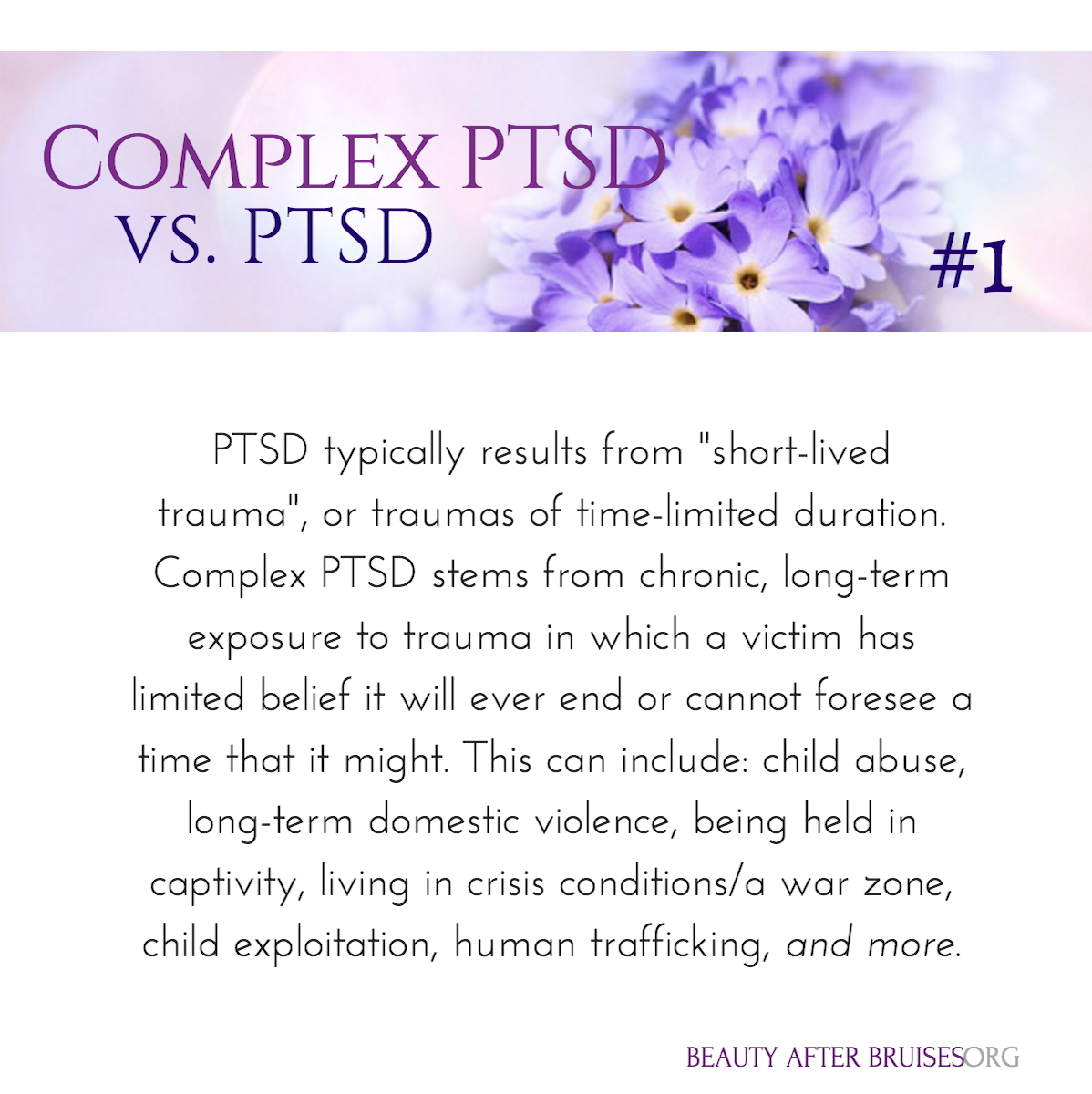
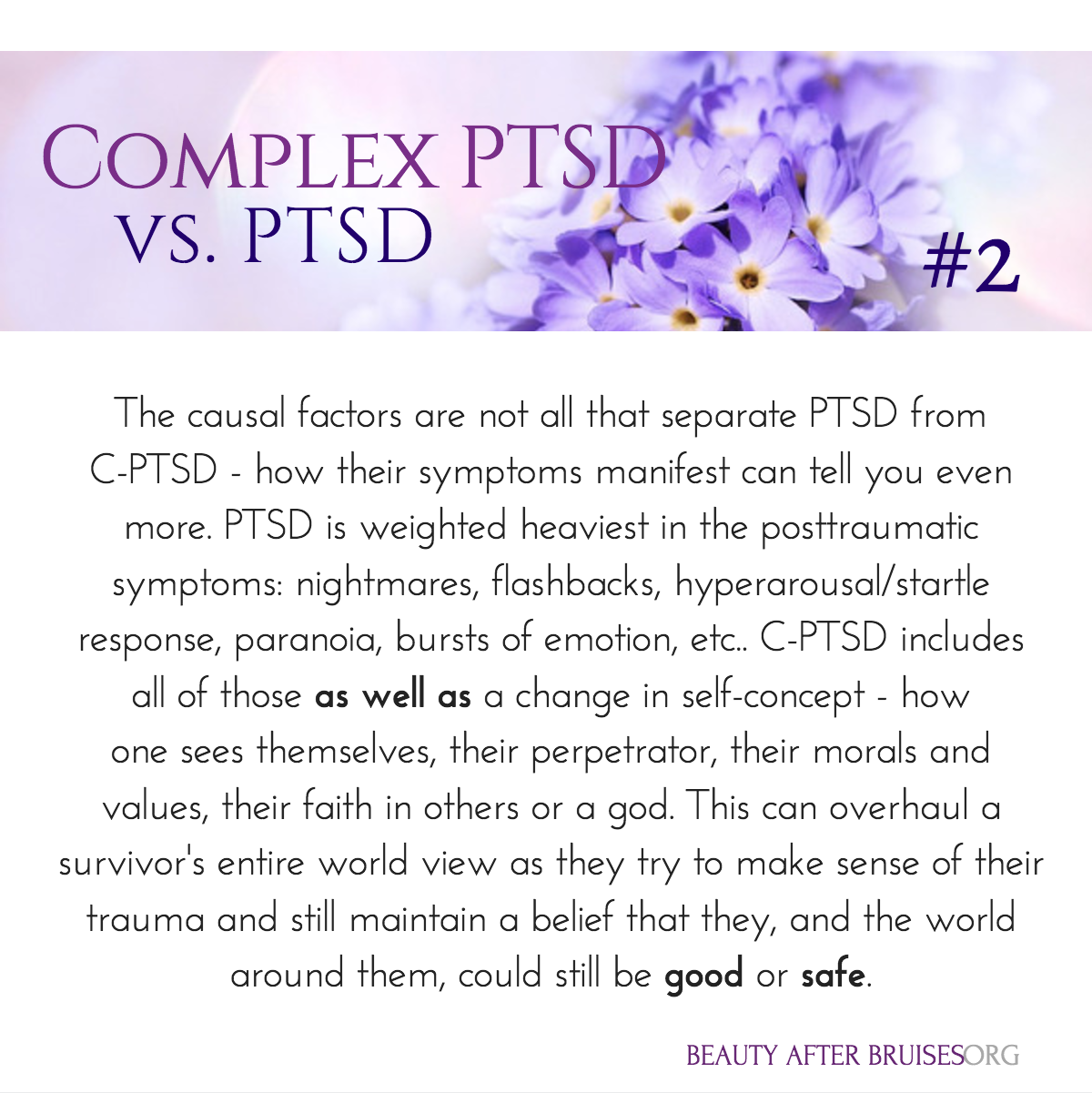
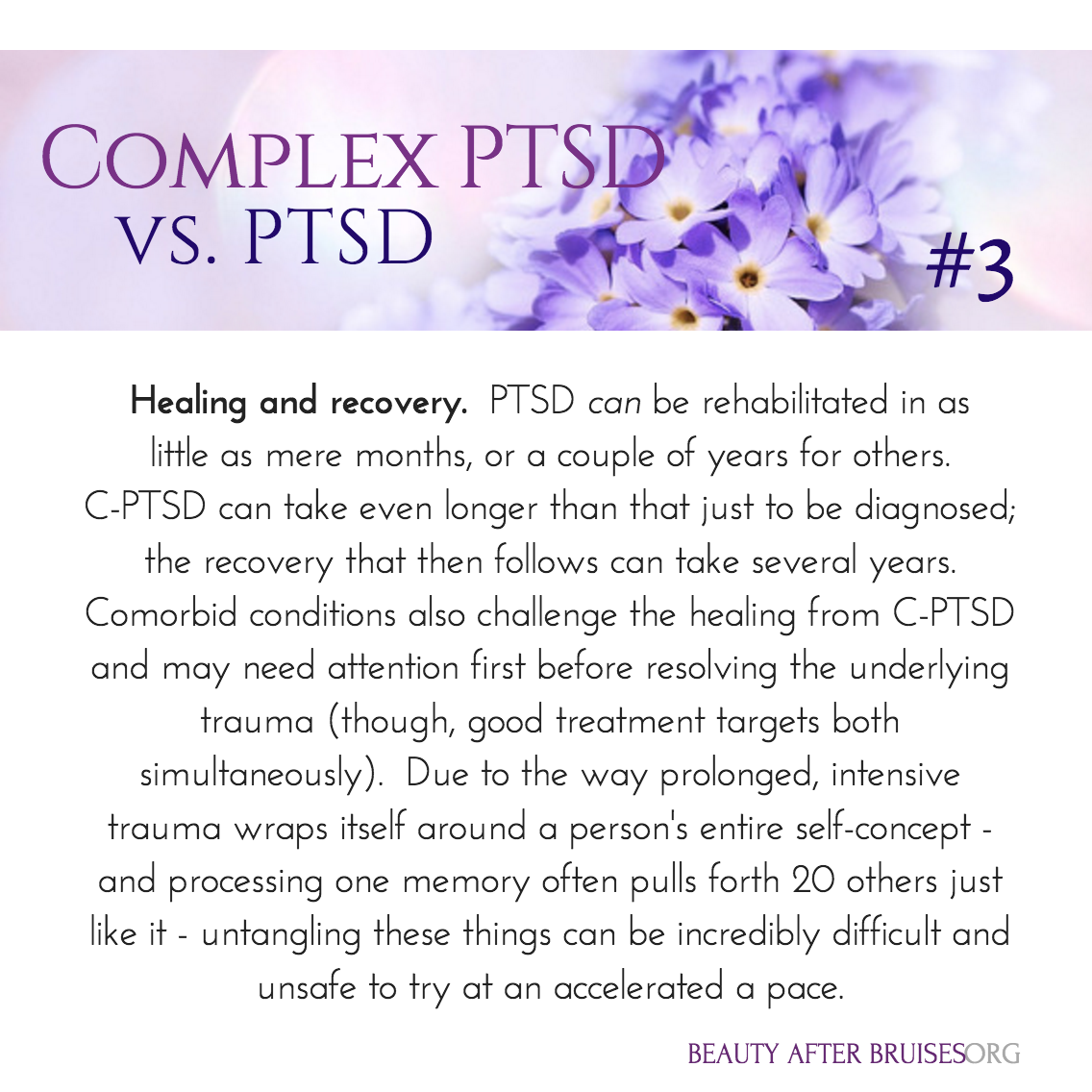
Why does c-ptsd exist?
Complex PTSD comes as a response to chronic traumatization over the course of months or, more often, years. This may involve emotional, psychological, physical, and/or sexual abuses; circumstances of domestic violence, life in a war zone, or being held captive; human trafficking, child exploitation, or other organized rings of abuse; and/or many other grueling circumstances. Complex trauma is interpersonal in nature, and survivors are typically at the complete and total control of another person, often unable to meet their most basic needs without them. They also have limited belief that it may ever end, with no ability to foresee, or even imagine, a time they may be free. While there are definitely circumstances where adults develop C-PTSD, it is most commonly seen in trauma during childhood. For those who are older, it requires a level of control over them that breaks down the psyche, disrupting their sense of self, their outlook on the world, and their former conceptualization of where they belong in it. For children enduring these conditions, they not only are wholly powerless in every way already, they’re also only just beginning to establish those larger concepts for themselves from the very first time (if at all yet). Additionally, because the brain is in its most malleable, vulnerable stages of growth, such severe trauma then interrupts the entire course of their psychologic and neurologic development. For some, it may even lead to an additional dissociative disorder.
When an adult experiences a traumatic event, they have more tools to understand what is happening to them, their place as a victim of that trauma, and know they should seek support even if they don't want to. Children don't possess most of these skills, or even the ability to separate themselves from another's unconscionable actions. The psychological and developmental implications of that become complexly woven and spun into who that child believes themselves to be — creating a messy web of core beliefs much harder to untangle than the flashbacks, nightmares and other posttraumatic symptoms that come later.
Another important thing to know is that the trauma to children resulting in C-PTSD (as well as dissociative disorders) is usually deeply interpersonal within that child's caregiving system. Separate from both the traumatic events and the perpetrator, there is often an added component of neglect, hot-and-cold affections from a primary caregiver, or outright invalidation of the trauma if a child does try to speak up. These disorganized attachments and mixed messages from those who are supposed to provide love, comfort and safety - all in the periphery of extreme trauma - can give way to even more unique struggles that PTSD-sufferers alone don't always face.
What does c-ptsd look like?
Due to the way complex trauma moulds itself into and around a person’s relationship with themselves and the world around them, it can manifest in a vast expanse of ways. Some of those qualities may be rather disruptive and very on-the-surface. Others can be seemingly imperceptible, to both the survivor and others in their lives, despite impacting them in fairly critical ways. It’s because of this that, in addition to all the symptoms found in classic PTSD, there are several other inter- and intrapersonal areas complex trauma survivors are likely to experience difficulty.
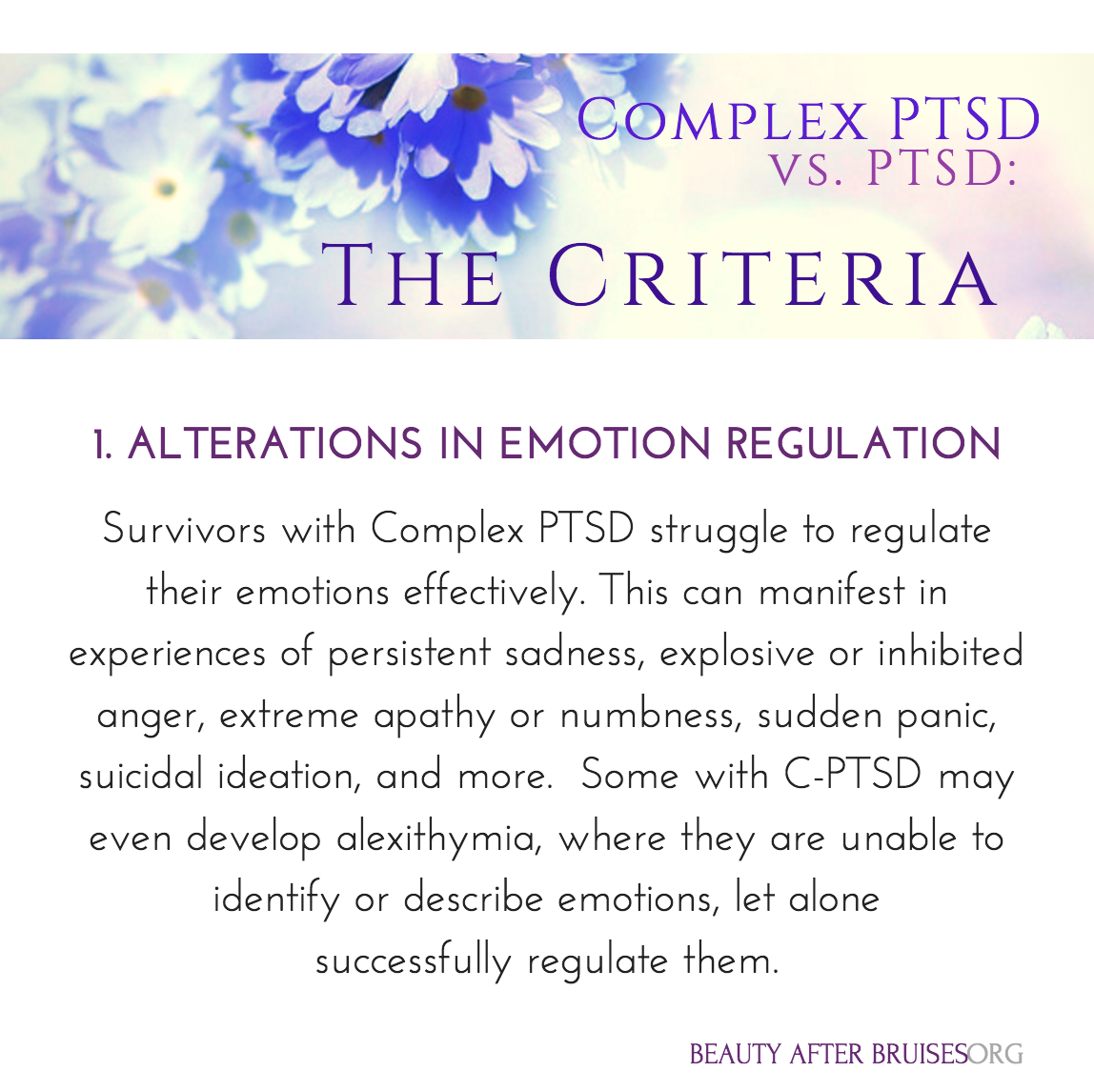
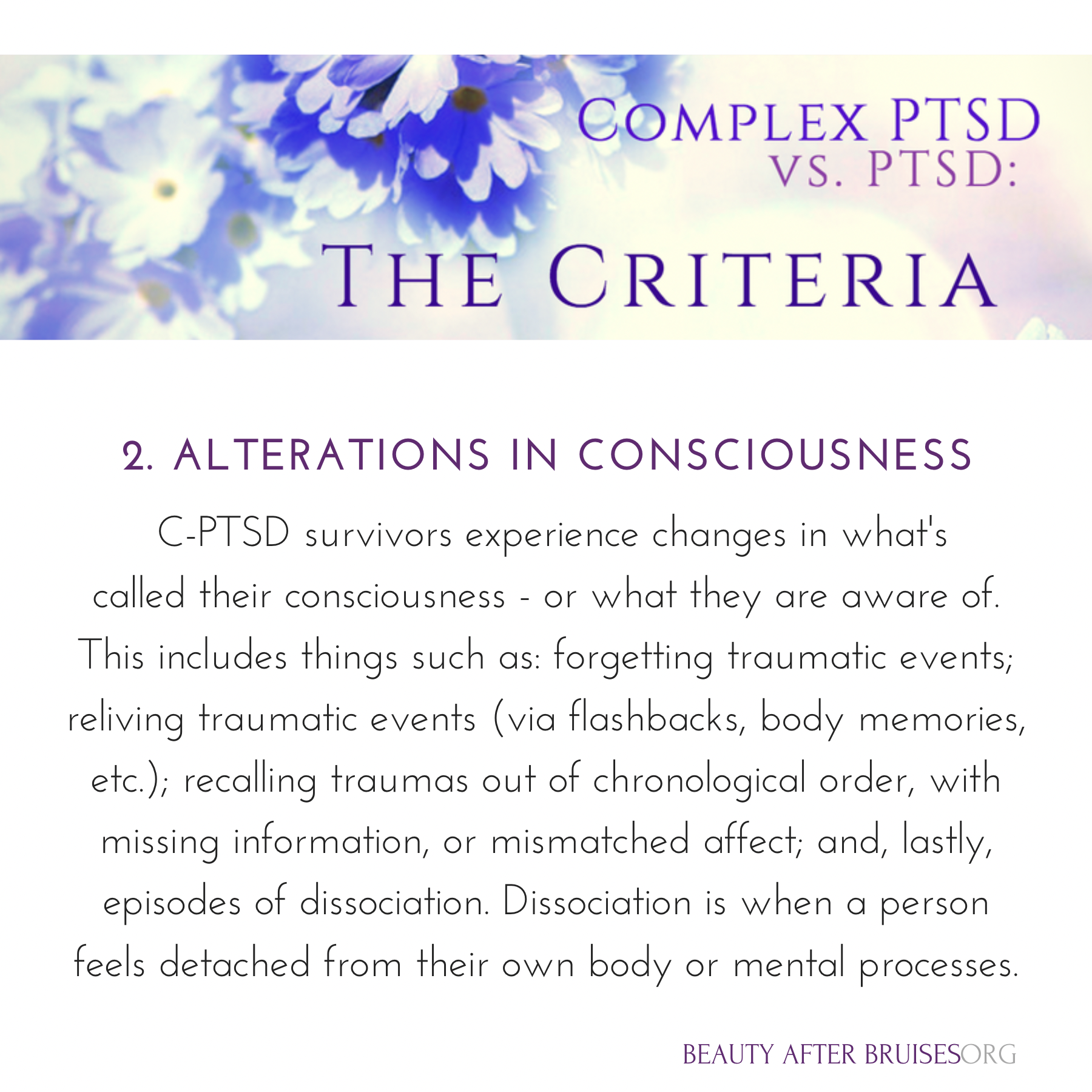
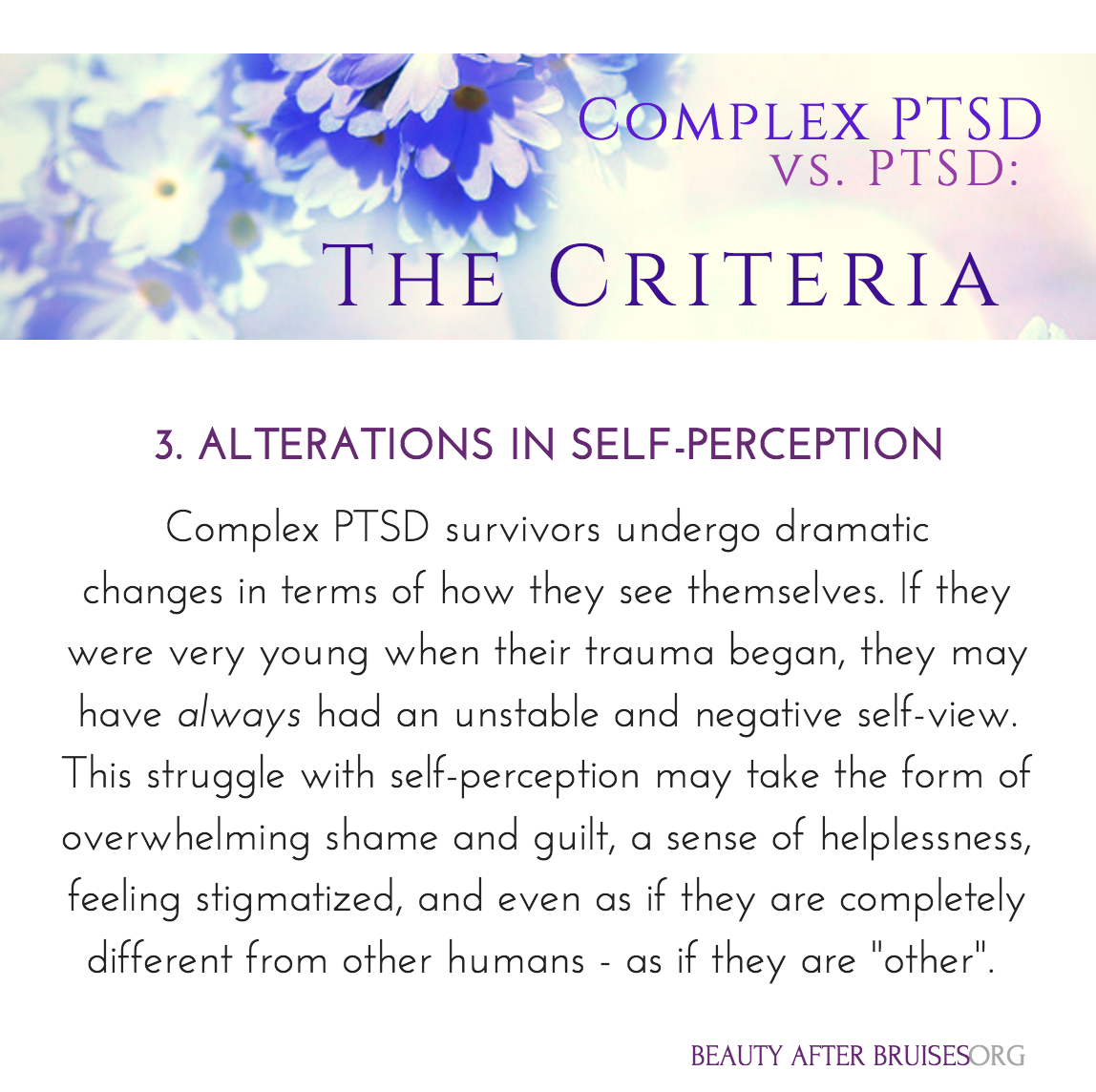
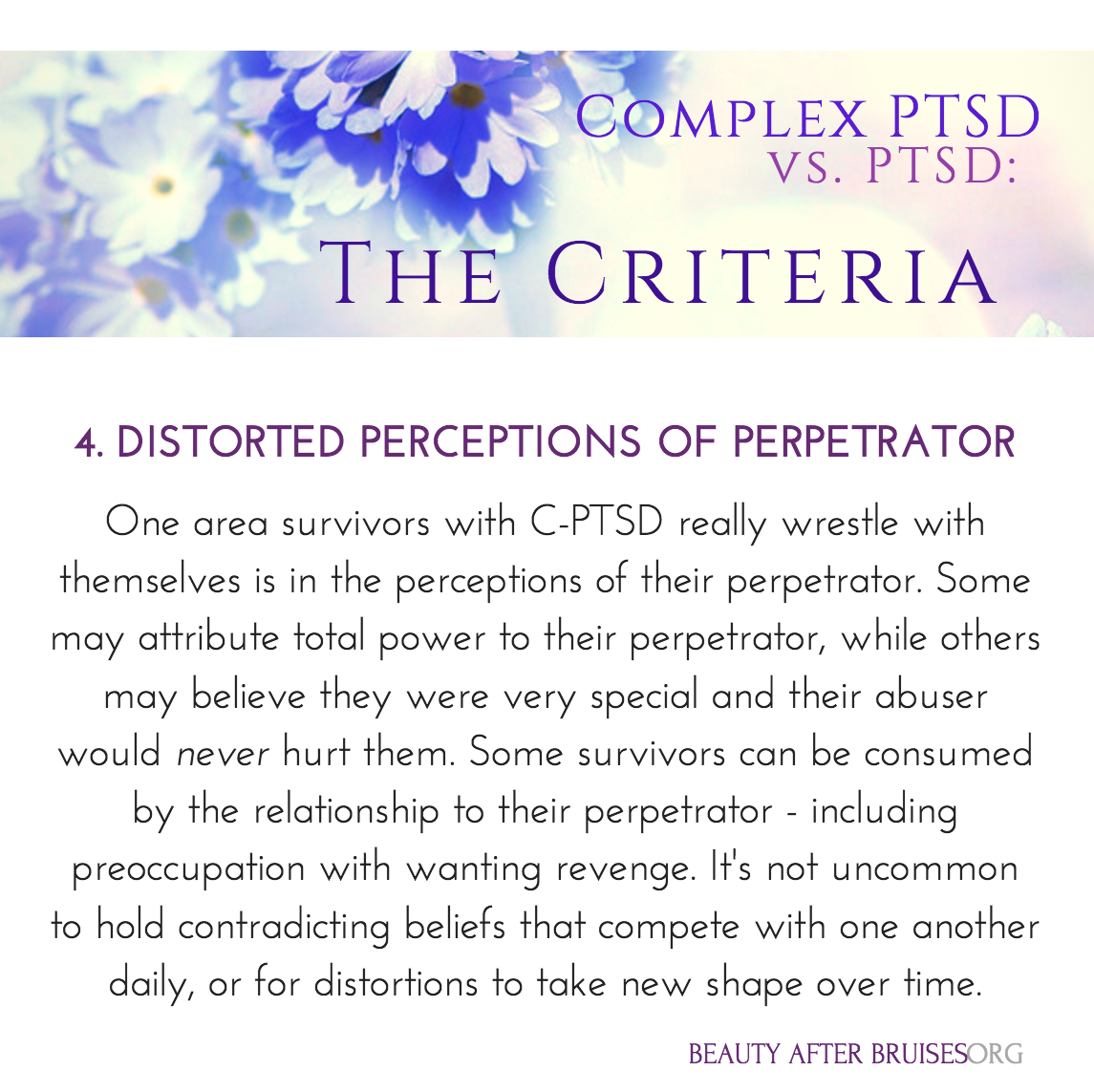
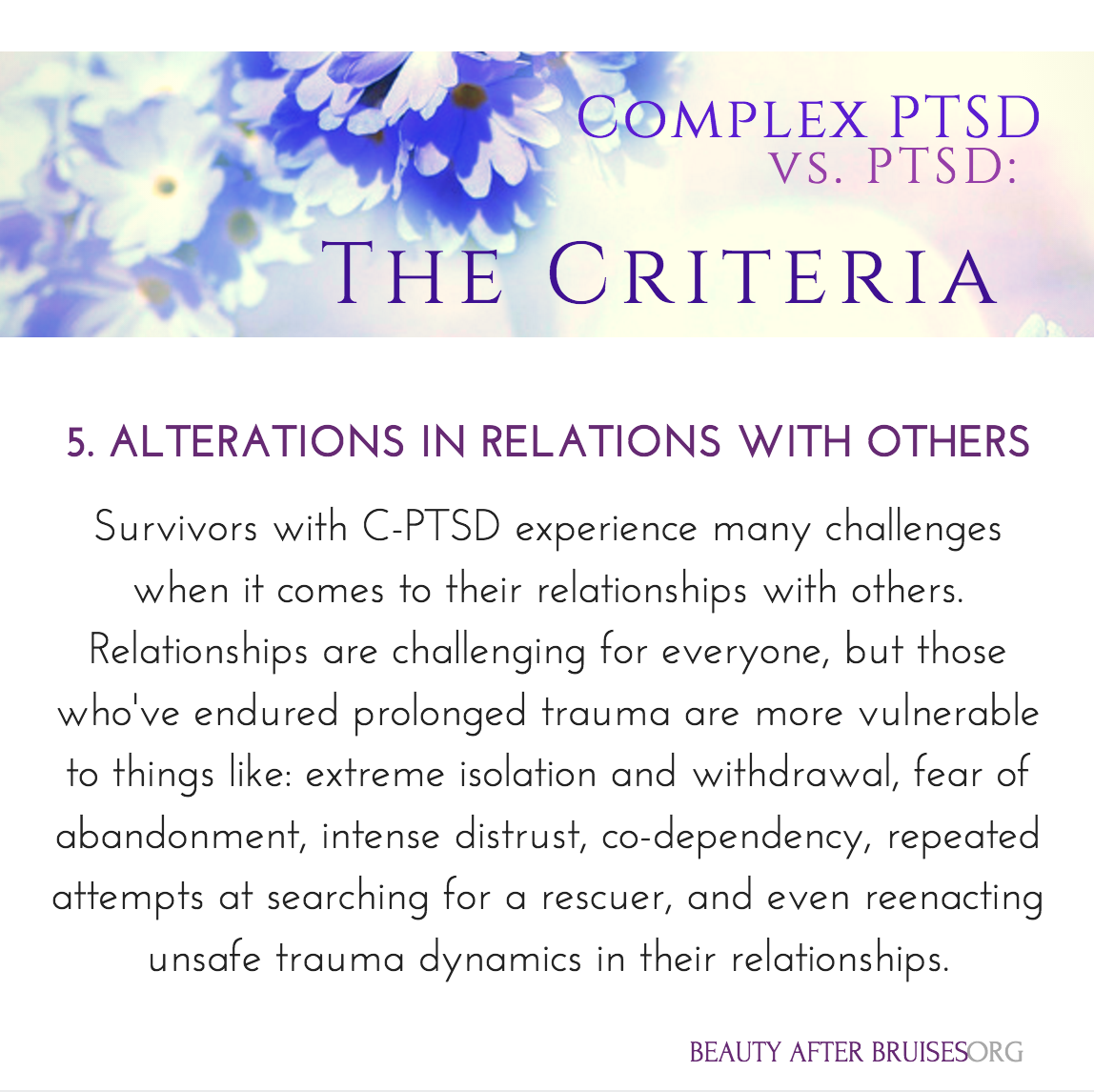
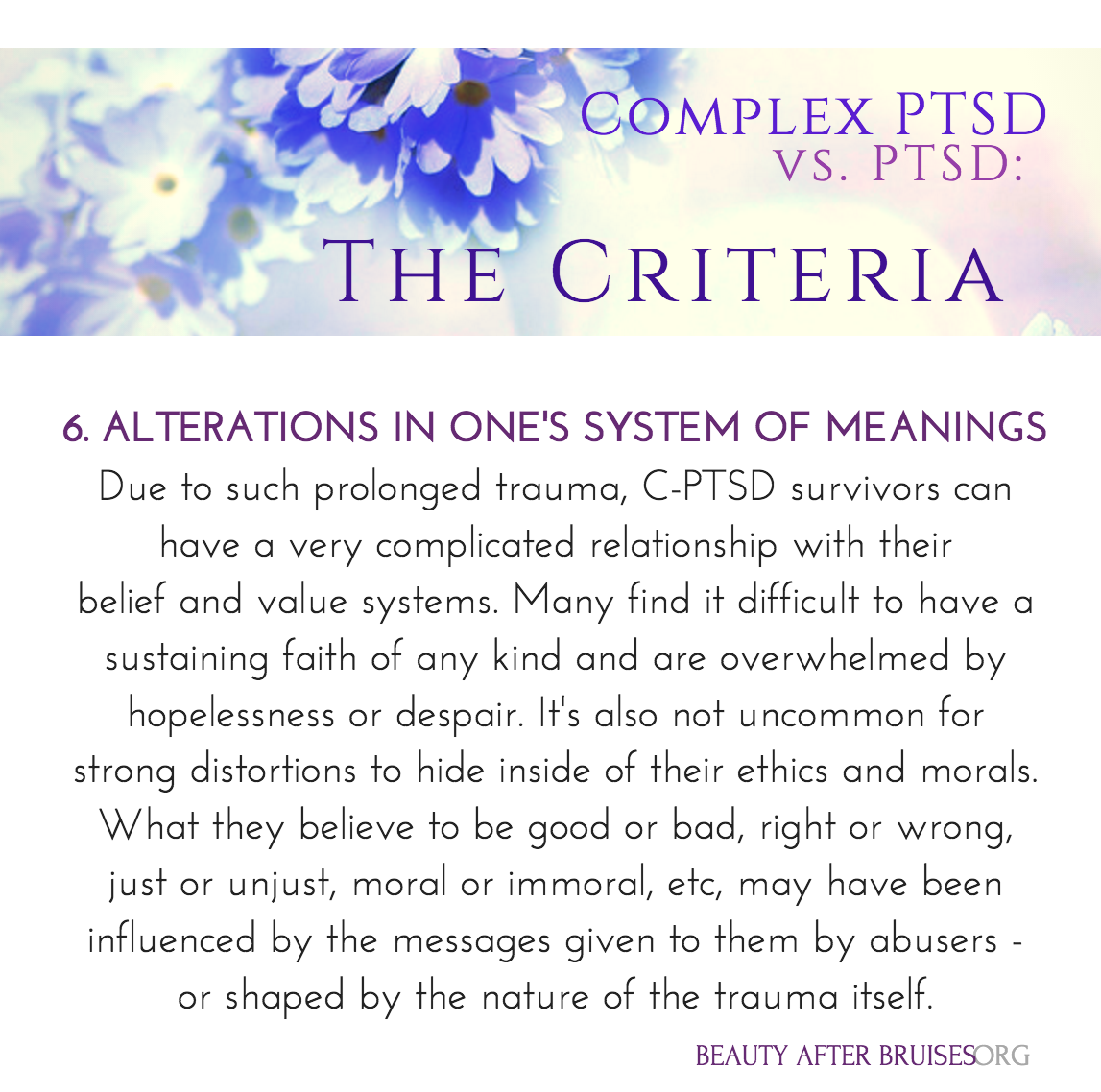
To delineate some of these hallmark challenges - as outlined in the proposed Complex PTSD criteria - we'll begin with the one that shows up most frequently in day-to-day life: emotion regulation. Survivors with Complex PTSD have a very difficult time with emotions -- experiencing them, controlling them, and for many, just being able to comprehend or label them accurately. Many have unmanaged or persistent sadness, either explosive or inaccessible anger, and/or suicidal thoughts. They may be chronically numb, lack the appropriate affect in certain situations, be unable to triage sudden changes in emotional content, or struggle to level out after a great high/low. It's also very common for these survivors to re-experience emotions from trauma intrusively - particularly when triggered. These feelings are often disproportionate to the present situation, but are equal to the intensity of what was required of them at the time of a trauma -- also known as an emotional flashback.
Difficulty with self-perception is another fundamental struggle for complex trauma survivors -- particularly because their identity development was either fiercely interrupted or manipulated by someone with ulterior motives. In its simplest form, how they see themselves versus how the rest of the world does can be brutally different. Some may feel they carry or actually embody nothing but shame and shameful acts - that they are "bad". Others believe themselves to be fundamentally helpless; they were let down by so many who could've stopped their abuse but didn't, so it "must just be them". Many see themselves as responsible for what happened to them and thus unworthy of kindness or love because "they did this to themselves". And, countless others may feel defined by stigma, believe they are nothing more than their trauma, worry they're always in the way or a burden, or they may sense they're just completely and utterly different from anyone or anything around them - they are alien. Startling as it is, all of these feelings and more can live inside someone whom, to you, seems like the most brilliant, competent, strong, and compassionate human being you know.
Interruptions in consciousness are also a prevalent - and at times very scary - reality in Complex PTSD. Some may forget traumatic events (even if they knew of them once before), relive them intrusively, recall traumatic material in a different chronological order, or other distressing experiences of what is called dissociation. Dissociation is a symptom that exists on a spectrum, ranging anywhere from harmless daydreaming or temporarily "spacing out"; to more disruptive episodes of feeling disconnected from one's body or mental processes, not feeling real, or losing time; all the way to the most severe, which includes switching between self-states (or alters), as is seen in Dissociative Identity Disorder. Episodes of missing time can range anywhere from a few minutes, a couple days, or even large chunks of one's childhood. The larger gaps in time are typically only seen in DID, but those with C-PTSD alone can still endure 'interruptions in consciousness' that result in memory gaps, poor recall, traumatic material that is completely inaccessible, or, conversely, re-experiencing trauma against their will (e.g. flashbacks, intrusive images, body memories, etc.)
Difficulty with relationships may seem like a natural progression since each area mentioned thus far can affect how fruitful your relationships are. But, these challenges go beyond a lack in quality or richness. This refers more to a survivor's potential to feel completely isolated from peers and not even knowing how to engage, to harboring an outright refusal to trust anyone (or just not knowing why they ever should), trusting people way too easily (including those who are dangerous, due to a dulled sense of alarm), perpetually searching for a rescuer or to do the rescuing, seeking out friends and partners who are hurtful or abusive because it's the only thing that feels familiar, or even abruptly abandoning relationships that are going well for any number of reasons.
With this in mind, and knowing more about the depths to which C-PTSD sufferers battle with their self-perception and interpersonal relationships, it may make it easier to empathize with them on the next category, which is:
The perception of one's perpetrators. This can be one of the most insidious battles for some survivors with Complex PTSD -- even if it seems crystal clear to those on the outside. Victims of such prolonged trauma may eventually surrender, assuming their abuser(s) total power over them, possibly even maintaining this belief once they're 'free'. "I'll always be under their thumb, they call all the shots, they may even know what's best for me more than I ever will." Others may feel deep sadness or profound guilt at just the thought of leaving them - including long after they've successfully left, if they were able. Some may remain transfixed by their abuser's charming side or the warm public persona that everyone loves; it may feel truly impossible to think ill of them. Many hold a constant longing for their abusers to just love them - craving their praise well into adulthood, slaving away in their personal lives just to make them proud. Alternatively, there are others who may obsess about them angrily, holding only hatred and disdain for them to the point of persistent bitterness and/or vengefulness. Some can even stir desires to seek that revenge. (Though, it should be clearly noted that it's not at all common for them to actually do so. It's more about the thoughts than the actions.)
Many survivors can have a primary, more surface-layer set of thoughts and feelings about their perpetrator(s), particularly when asked. They may know what they're "supposed to say" or "supposed to feel", and then follow suit. But it's helpful to know that a collection of all these responses can, and often does, coexist within one person, vacillating between extremes underneath what's shown to the world or even to themselves. Day to day, and year to year, their feelings may shift - and - what the survivor knows to be true intellectually versus what they feel emotionally may remain incongruent for a very long time.
One's 'System of Meanings'. Of the many, many well-observed developmental disruptions those with C-PTSD face, one that many find to be the toughest to conquer, even with therapy, is one with which we hope to offer the most help and support. That area is what's referred to as one's 'system of meanings' ; an area that, after being subjected to such tumultuous trauma, can feel almost irreparable. What this criterion is referring to is the struggle to hold on to any kind of sustaining faith or belief that justice will ever be served to indiscretions of ethics and morality. These survivors' outlook on life and the world at large can be unfairly contorted, and understandably so.
They may doubt there is any goodness or kindness in the world that isn't selfish-hearted. They may worry they'll never find forgiveness. Others may even believe they only came to this world to be hurt, so there can be no good coming for them. This level of hopelessness and despair, as well as these greater meanings assigned to their suffering, can fluctuate greatly over time. There may even come several years where things no longer feel so bleak or as though they were conned of a meaningful life. But, as more layers of trauma are processed in therapy, or new memories bubble to the surface, they may wrestle with it once more as new feelings strike a devastating chord inside their chest. This is a common experience for so many survivors, and can have lasting ramifications with each plunge. We want to be here to help bring pause to those deep swings into the darkness - doing what we can to keep survivors in the light a little longer. Or, better yet, support them in adding some of that light inside of themselves. That way, even if they need to hide in the darkness for a bit, the light never leaves them for good. We're still here.
~~
・Stay tuned for a page on Dissociative Disorders! For now, these two articles we've
written provide a great introduction. Here and here! ・
Why survivors NEED OUr Help
There are less than 5 psychiatric hospitals in the US that offer specialized treatment for those with Complex PTSD and dissociative disorders. Other hospitals do not have the treatment teams or properly-trained unit staff needed to safely treat the nuances of complex trauma. Many are still sent to those facilities anyway.
Insurance providers prefer to work within their participating network of hospitals and therapists. Most will at least deny out-of-state care. With hospitals being in only a few states, this makes an inpatient admission an impossibility for many. For outpatient care, with treatment still both specialized and limited, searching for a participating provider within a given geographic area often yields zero results.
Without the participation of insurance, specialized hospitals are often forced to require up-front funding before accepting an admission. This funding can range anywhere from $10,000 to $50,000, and then accumulates once the patient stays beyond what that amount provides. Asking a patient to supply this astronomical fee while in a state of crisis and requiring a higher level of care, unsurprisingly, means many go without treatment.
Inpatient and intensive outpatient programs (IOP) for complex trauma are very grueling and comprehensive; they require longer-term stays to both stabilize patients and begin the therapeutic process. 3-6 weeks is an average length of stay for many programs, though some patients find they need care for a couple months or more once they've begun.
The lack of inpatient facilities and well-trained personnel isn't just a scarcity when it comes to higher levels of care. The number of outpatient therapists with the training and tools needed to treat Complex PTSD and dissociative disorders is shockingly low. The [falsely] perpetuated idea that therapists would never see cases like these, and the reality that clients who are suffering this way frequently struggle financially, keeps many professionals from making the time and financial commitment to further their education and become qualified clinicians.
Survivors with C-PTSD and dissociative disorders often require therapy for more than ten years on average. An additional number of years (up to several more) are all too often lost on ineffective or harmful therapy and receiving several misdiagnoses before ever obtaining a proper one. Following the most intensive phases of therapy, with memory processing completed, many patients still find themselves needing some form of therapy or psychiatric care for many, many years to come.
With a national average cost of specialized therapy sessions being $100+ per visit, and clients often requiring twice weekly sessions for the first few years, out-of-pocket expenses can easily range from $5,000-$20,000 yearly. This does not include psychiatric care, medications, or the added travel expenses accumulated by those who must travel hour(s) to and from appointments.
Many insurance providers place a limit on the number of mental health-related expenses or appointments they'll cover yearly. This requires patients to either have a robust source of expendable income, or strategically plan and arrange their sessions like a puzzle just to gain what they can from their treatment before the days run out. Naturally, many lose access to the care they need and are forced to piece-meal their therapeutic journey in spurts each year, which is grossly ineffective.
A vast amount of patients with C-PTSD, and especially dissociative trauma disorders, can be so encumbered by flashbacks, dissociative symptoms, or other co-morbid physical/psychological disorders, they cannot work. This causes many to rely on state Medicaid programs which fail to provide skilled therapists trained in treating their condition. Medicaid programs also frequently fail to acknowledge the basic need for weekly visits, let alone more frequently or on an ongoing basis. The amount Medicaid is willing to reimburse a qualified therapist when negotiating a non-participating provider agreement, is often so minimal the therapists themselves cannot maintain a viable practice. They're forced to say no.
A MORE COMPLEX LOOK AT COMPLEX PTSD
“The traumatic stress field has adopted the term “Complex Trauma” to describe the experience of multiple and/or chronic and prolonged, developmentally adverse traumatic events, most often of an interpersonal nature (e.g., sexual or physical abuse, war, community violence) and early-life onset. These exposures often occur within the child’s caregiving system and include physical, emotional, and educational neglect and child maltreatment beginning in early childhood.
”
A clinical perspective: including co-occuring disorders and trauma's effects on medical health
Complex posttraumatic stress disorder (C-PTSD) is a disorder that can result from severe, chronic, or extremely threatening trauma. Often, this trauma is also interpersonal, happens early in life, lasts for a long time, involves a mix of trauma types, or is followed by one or more unrelated traumas. C-PTSD involves all of the core symptoms of posttraumatic stress disorder (PTSD) in addition to symptoms that reflect the global impact of the trauma. Simply put, in addition to traumatic intrusions, avoidance, negative alterations in cognition and mood, and alterations in arousal and reactivity, C-PTSD also involves distorted perceptions of the victim's perpetrator (such as feeling positively towards an abuser, viewing them as all-powerful, or being obsessed with "getting even" with them), and the negative alterations in cognition and mood are much more extreme. For example, while someone with PTSD may feel depressed following a natural disaster, someone with C-PTSD may feel helpless, shameful, or completely different from other people following years of neglect or abuse. They may struggle to form interpersonal relationships and be caught between distrust and a need to escape feelings of isolation. They completely lose their faith and fail to find any meaning in life. As well, they may struggle with intense anger that they desperately try to inhibit or direct either outward in explosive bursts or inward through self harm or suicidal expressions. Finally, dissociation plays a far greater role in C-PTSD than it does in PTSD, and many individuals with C-PTSD struggle with chronic depersonalization (feeling like they are unreal) and/or derealization (feeling like the world around them is unreal), dissociative amnesia (being unable to remember some or all of the trauma), identity confusion (being unsure of who they are or feeling like the trauma destroyed their sense of self), or even identity alteration (switching between dissociative parts, or alters).
C-PTSD is very often comorbid with dissociative disorders, including dissociative identity disorder (DID) or other specified dissociative disorder (OSDD). Other common comorbidities include borderline personality disorder (BPD); depressive or bipolar disorders; anxiety disorders; obsessive compulsive disorders; eating disorders and substance abuse. Most individuals with DID or OSDD have C-PTSD because the trauma that caused their conditions was often interpersonal, chronic, and severe as well as something that occurred during childhood and so had a very strong developmental impact. In contrast, while C-PTSD is less common among individuals with BPD, BPD with comorbid PTSD shares many diagnostic features with C-PTSD - making it at times difficult to differentiate. Some key differences between the disorders are that the self harm or suicidal behaviors driven by emotional instability play less of a role in C-PTSD; individuals with just BPD have a shifting self concept whereas those with C-PTSD are seen to have a stable negative self concept; individuals with C-PTSD are more likely to feel isolated and distrustful rather than fearing abandonment and shifting between idealization and devaluation; and dissociation is more common in and plays a greater role in C-PTSD. Nonetheless, it is not at all uncommon for an individual to have both C-PTSD and BPD (or C-PTSD, BPD, and DID or OSDD) with some combination of other comorbid conditions. Again, this is because the type of trauma that can result in C-PTSD can have strong effects on an individual's relationships with others, relationship with their self, and even their ability to conceptualize themselves.
Where the negative symptoms of PTSD may be more temporary or clearly understood to be a result of the disorder, individuals with C-PTSD may have their entire personalities and views of life shaped by their trauma history. Unfortunately, their symptoms aren't just limited to their mental state. Individuals with C-PTSD are also vulnerable to physical symptoms that cannot be medically explained but instead can be associated with their internal pain and stress. These physical symptoms, called somatic symptoms, can include neck and back pain; headaches and migraines; gastrointestinal problems including irritable bowel syndrome; allergies; thyroid and other endocrine disorders; chronic fatigue syndrome; or a disorder called fibromyalgia that involves widespread musculosketal pain, fatigue, and problems with sleep, memory, and mood. As well, the trauma that causes C-PTSD can trigger or exacerbate existing chronic illnesses or genetic vulnerabilities. All of this can push an already mentally and emotionally taxed trauma survivor past their limit when triggers increase their C-PTSD symptoms and cause their somatic or physical conditions to flare. In highly dissociative trauma survivors especially, such intense periods are likely to lead to emotional numbing, difficulties with autobiographical memory, periods of intense derealization or depersonalization, fugue episodes in which the individual travels and engages in actions while in a trance state, or switching between dissociative parts. While this can temporarily ease the pain of processing traumatic memories and physical ails, it can interfere with long term healing and make work, school, and interacting with others difficult. Dissociation as a response to the stress caused by trauma and resulting C-PTSD can also increase the risk of revictmization, or further trauma and abuse.
Sources:
http://www.ejpt.net/index.php/ejpt/article/view/25097
http://www.ptsd.va.gov/professional/PTSD-overview/complex-ptsd.asp
http://did-research.org/origin/comorbid/trauma-stress/c-ptsd.html
http://did-research.org/origin/comorbid/trauma-stress/ptsd.html
http://psychcentral.com/lib/complex-post-traumatic-stress-disorder/
http://www.healthyplace.com/blogs/understandingcombatptsd/2015/06/05/complex-posttraumatic-stress-disorder-ptsd-vs-simple-ptsd/
http://www.traumacenter.org/products/pdf_files/complex_ptsd.pdf

